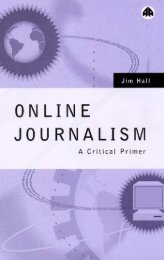Modul Mata Kuliah Journalisme Online - Ayo Menulis FISIP UAJY
Modul Mata Kuliah Journalisme Online - Ayo Menulis FISIP UAJY
Modul Mata Kuliah Journalisme Online - Ayo Menulis FISIP UAJY
Create successful ePaper yourself
Turn your PDF publications into a flip-book with our unique Google optimized e-Paper software.
Be interesting.<br />
Be conversational: raise questions, invite contributions, discuss what’s happening on other<br />
blogs, leave some loose ends, and respond to comments made by readers.<br />
Link to external sites with relevant information<br />
Monitor other bloggers in the same space and attempt to build reciprocal links with them.<br />
Tag posts so that they are easy for search engines to find.<br />
Inject some personality into their posts and include observation and anecdote.<br />
Make use of multimedia whenever possible and think about a post’s layout.<br />
Credit the original source of all content embedded in posts.<br />
Make sure posts are seen by a second pair of eyes before publication.<br />
Ask desks to place a link to their blog/post on relevant stories.<br />
A Reuters blogger should not:<br />
Be opinionated. You are free to make observations, ask questions and make an argument, but<br />
blogging in Reuters is not a license to vent personal views. You are still bound by the Trust<br />
Principles.<br />
Respond in anger to comments that appear on posts.<br />
End each post with the line, ‘tell us what you think’. If you have a specific question for readers<br />
then ask it, otherwise let the comments box do the work for you.<br />
Knowingly link to material that infringes copyright.<br />
Have the colour and personality subbed out of their posts<br />
Take an idea or insight from another blogger or site without acknowledgement.<br />
Reuters use of blogging is constantly evolving and up-to-date guidance on how blogs are being used is<br />
available on the blogging wiki at http://wiki.ime.reuters.com/index.php/Blogging<br />
To correct a blog, see blogs under Corrections, Refiles, Kills, Repeats and Embargoes<br />
<strong>Online</strong> Encylopedias<br />
<strong>Online</strong> information sources which rely on collaborative, voluntary and often anonymous contributions<br />
need to be handled with care. Wikipedia, the online "people's encyclopedia", can be a good starting<br />
point for research, but it should not be used as an attributable source. Do not quote from it or copy<br />
from it. The information it contains has not been validated and can change from second to second as<br />
contributors add or remove material. Move on to official websites or other sources that are worthy of<br />
attribution. Do not link to Wikipedia or similar collaborative encyclopedia sites as a source of<br />
background information on any topic. More suitable sites can almost always be found, and indeed are<br />
often flagged at the bottom of Wikipedia entries. It is only acceptable to link to an entry on Wikipedia or<br />
similar sites when the entry or website itself is the subject of a news story.<br />
Retrieved from "http://handbook.reuters.com/index.php/Reporting_from_the_internet"<br />
Category: Specialised Guidance
















